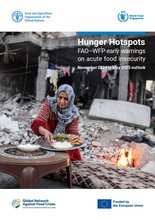
Based on thorough context analysis at that time and past experience, the WFP CS identified three priorities: (i) Food and Nutrition Security; (ii) Capacity Development of Government Institutions; and, commendably, (iii) Humanitarian Response; with capacity development implemented as cross-cutting support.
The evaluation found that WFP was widely appreciated for its expertise in food assistance, policy support, flexibility and transparency. Strategically, stakeholders perceived WFP as a leading and influential partner, diligently applying its comparative advantages in General Food Assistance (GFA), Vulnerability Assessment and Mapping (VAM), disaster response, logistics, and innovations such as Purchase for Progress (P4P). Strategic choices were influenced by WFP mandate; national context and policies; the shift from food aid to food assistance and availability of funds. Overall, WFP’s portfolio, including large-scale GFA was relevant, effective, timely, and aligned with Humanitarian Principles. A number of national policies and strategies were also successfully developed with WFP’s assistance. The evaluation found some evidence that WFP contributed to increased enrolment and attendance in assisted schools while achieving lower dropouts and gender parity, but insufficient data to assess effectiveness of nutrition interventions. Promising results were found in the smaller-scale community recovery and development activities; and a significant amount of cash ($4.75 million) was injected by P4P into the local economy. WFP responded effectively to the 2014 flooding emergency through life-saving assistance. However, coupled with weak synergies and integration, serious funding shortfalls affected performance, results and sustainability across the portfolio, involving trade-offs between increasing beneficiary coverage and reducing quantities and duration of food distributed.
The evaluation makes nine recommendations: refocusing WFP’s food assistance on i) food and nutrition security, and ii) emergency preparedness and response, based on proactive strengthening of synergies; improving targeting and program integration; enhancing women’s economic empowerment; expanding carefully-designed safety nets, incorporating humanitarian and protection principles in WFP’s strategic and program documents; supporting development of national strategy for stunting reduction; strengthening school feeding; promoting community resilience with comprehensive Food for Assets (FFA) packages; enhancing resource mobilization; and improving consistency of outcome monitoring and analysis.



